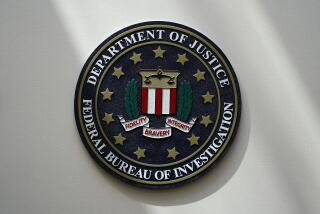Terror Plot Trial Opens for Sheik, 11 Followers : Courts: Prosecution paints picture of radicals bent on vast destruction in N.Y. Defense portrays charges as empty talk, religious rhetoric.
NEW YORK — As the biggest terrorism trial in the nation’s history got under way Monday, a federal prosecutor told jurors that a blind Egyptian sheik and his “radical followers” had plotted a series of deadly acts “more devastating than the World Trade Center bombing.”
Speaking moments after a jury of seven women and five men was sworn in by U.S. District Judge Michael B. Mukasey, prosecutor Robert Khuzami outlined evidence he said would show that Sheik Omar Abdel Rahman and 11 others conspired to machine-gun guards at FBI headquarters in Manhattan, plant a bomb at the United Nations building and drive vehicles laden with explosives into the Lincoln and Holland commuter tunnels, killing thousands of motorists in “unimaginable horror.”
But defense attorneys, in their own opening remarks, ridiculed Khuzami’s description, declaring that the alleged plot was nothing but empty talk in some instances or misconstrued religious utterances in others.
With jury selection having taken three weeks, Mukasey said the trial could last as long as nine months. As in the O.J. Simpson double-murder case in Los Angeles, jurors were identified only by numbers in hopes anonymity will shield them from outside pressures. Unlike Simpson jurors, they will not be sequestered.
“This case is not about religion or about the great social issues of the day,” Khuzami told the jury.
“It’s a simple case of men who planned a war of urban terrorism. They planned to slaughter people as they traveled between New York and New Jersey or sat in office buildings while there were ticking time bombs underground.”
“Dr. Rahman is not being charged because of anything he did,” insisted Lynne Stewart, his attorney.
“Blind since infancy and diabetic, he is charged with conspiracy only because of his words--words uttered as religious teaching, words protected by our Constitution.”
The trial is taking place under extraordinary security. Police--some with dogs--stood behind wooden barricades around the courthouse as sharpshooters took positions on the roof.
The courtroom itself was ringed by more than 20 federal marshals.
Most of the defendants wore dark suits and ties as they sat alongside their lawyers, except for the sheik and two others who wore Arabic robes and head coverings.
Stewart, her voice rising in indignation, attacked the prosecution’s chief witness, FBI informant Emad Ali Salem, as “a liar and a fraud” who was paid $1 million for his undercover work in secretly taping the sheik and many of his co-defendants.
Roger Stavis, another defense attorney, called Salem an agent provocateur who encouraged some talk of bombings and other crimes.
Khuzami, who spoke first, anticipated the attack on Salem, who served as the sheik’s bodyguard, confidant and part-time translator while secretly cooperating with the FBI.
He said Salem’s work was valuable to the FBI in saving lives and widespread destruction, “but he did not come cheap, receiving in excess of $1 million.”
“When he was invited to participate in the plans (by the defendants), the government proposed that he wear a tape recorder,” Khuzami said.
Khuzami suggested that he was unwilling to give high marks to Salem’s credibility.
“You will learn he did not always tell the truth,” he told jurors. “But listen to his testimony and see how it stacks up against other evidence in the case.”
Prosecutors and FBI officials were outraged when they learned months ago that Salem not only had tape-recorded his conversations with the defendants but also had secretly recorded his talks with his FBI handlers.
In an apparent effort to increase his informant fees, he seemed to elicit agreement from unsuspecting FBI agents that he had warned them about the February, 1993, bombing of the trade center, in which six people were killed and more than 1,000 were injured.
Federal sources have denied getting warning of this act, which resulted in the conviction of four militants last year. Khuzami told the jury, however, that Abdel Rahman had inspired the trade center bombing in addition to the other supposed plots that the government says were foiled with arrests of the current defendants on June 24, 1993.
Stavis, representing El Sayyid A. Nosair, objected to Khuzami’s characterization of the defendants as radicals who waged a war of “holy jihad” against the United States because of its support for Israel and Egypt.
Declaring that religious principles cannot be equated with terrorism, Stavis said: “Radical is a label we often put on things we don’t understand. Jesus Christ was a radical, ladies and gentlemen. Dr. Martin Luther King was called a radical.”
The judge hopes to conclude opening statements by late today. Then, according to draft instructions he has prepared, he plans to tell jurors that if someone breaks the law, “the fact that it is undertaken in the name of religion is no defense whatsoever.”
More to Read
Sign up for Essential California
The most important California stories and recommendations in your inbox every morning.
You may occasionally receive promotional content from the Los Angeles Times.










